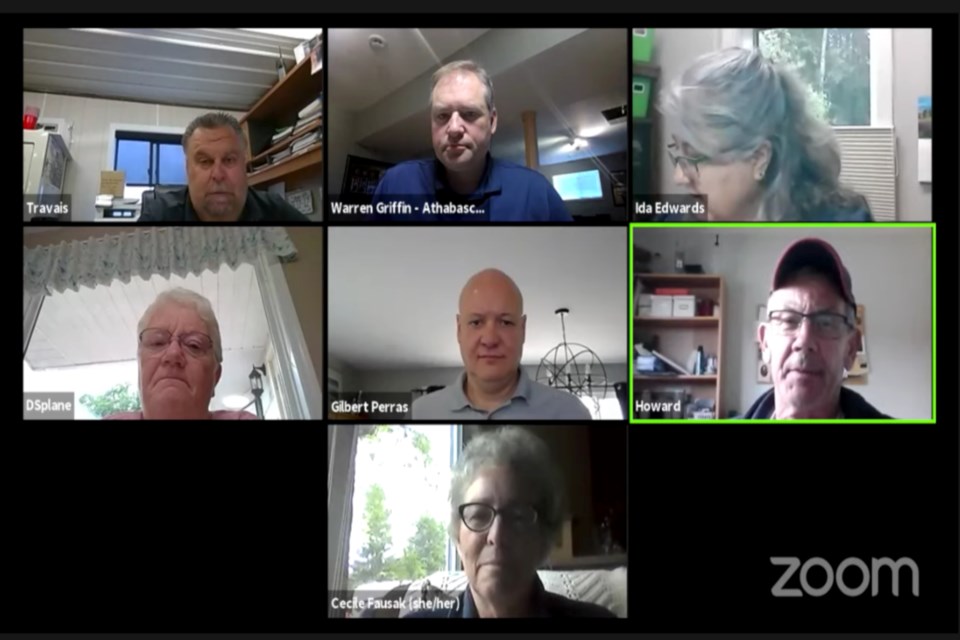ATHABASCA — It’s been more than a year since the Save Chain Lakes North Action Group started its work, and while there have been some wins over that time, the possibility of seeing local parks closing is still on their minds.
Group coordinator Cecile Fausak met with the Tourism and Economic Development (TED) committee June 17 to discuss what has happened, what the group will be focusing on moving forward and highlighted the positive economic and tourism impacts of economic of the lakes.
“Let me introduce you to the lakes,” Fausak opened by saying. “I think the prime one is Chain Lake and it's just north of the Island Lake Campground on the east side, but this is a real gem.”
She noted there’s 21 sites in the campground 49 kilometres northwest of Athabasca and it’s stocked with tiger and rainbow trout adding there are people who specifically go there for the fishing while personally, she enjoys going for the bird watching.
“And there's a great sandy beach there and swimming and there's never any blue green algae there and you can count on a really nice clear lake,” she said.
Fausak pointed out Lawrence Lake, 46 kilometres northwest of Athabasca, which was also on the Alberta government`s list of parks to partially or fully close also has 25 campsites, but half are still closed.
“Lawrence Lake is just off the highway and I find that the campsite right next to the highway very noisy, but the part that isn't open is up higher and away from the highway,” said Fausak.
The third park the action group wants to protect is the Fawcett Lake Campground, 109 kilometres northwest of Athabasca, which has 58 sites.
“Again, Sun Cruises Media said it was another one of the hidden gems in Alberta Park’s system, and it does have a historical connection too with a World War II POW camp having been there at one time,” she said. “So, these are all places that people primarily have to pass through Athabasca to get to.”
The Canadian Parks and Wilderness Society accessed the Alberta government’s discussion about the parks through the Freedom of Information Act, but Fausak said the discussions the information disclosed were confusing.
“By and large, they were saying that provincial recreation areas with no multiple values or of small size would be considered for divesting or deregulation and that they would seek partnerships for those,” she said. “We're not sure what small meant because there were places with 58 versus 21 camp sites, versus over 100 camp sites closed and never any sense of what acceptable utilization rate might look like.”
She also said the material showed the government was aware there would be public outcry over losing Chain Lake, but they went ahead and added it to the list anyway.
“Our group started a petition in July (2020), and one of the places we set up every Saturday was at the (Athabasca) Farmers’ Market, and it really tells you how many tourists are coming into this area because there were way more people outside of the county who signed a petition there than inside.”
When the government walked back the plan to close some of the parks and recreation areas, the group was told the parks would be open for the 2021 camping season and adequately serviced, Fausak said.
“I went out to Chain Lake on the Friday of the May long weekend and those promises were not fulfilled,” she said. “And it wasn't for Lawrence Lake either.”
Fausak asked the TED committee to write to Alberta Environment and Parks (AEP) deputy minister Bev Yee and Luc Nowicki, AEP regional director for Lesser Slave River.
“Going into those conversations I just raised some questions for your committee to consider the conservation value, the tourism value, the healing value of these recreation areas and how you might determine what the user demand is and how you might promote and increase people going to these areas and stopping in Athabasca along the way,” she said.
The committee decided to have TED officer Rachael Dragun contact her counterpart in the M.D. of Lesser Slave River saying they didn’t want to advocate for something the municipality didn’t want to take on.
“I just think we do have concerns closer to home,” said TED member and Town of Athabasca councillor Ida Edwards. “I'm looking at Poacher's Landing and some of the lakes by Boyle that we might be asking for letters of support for too.”



